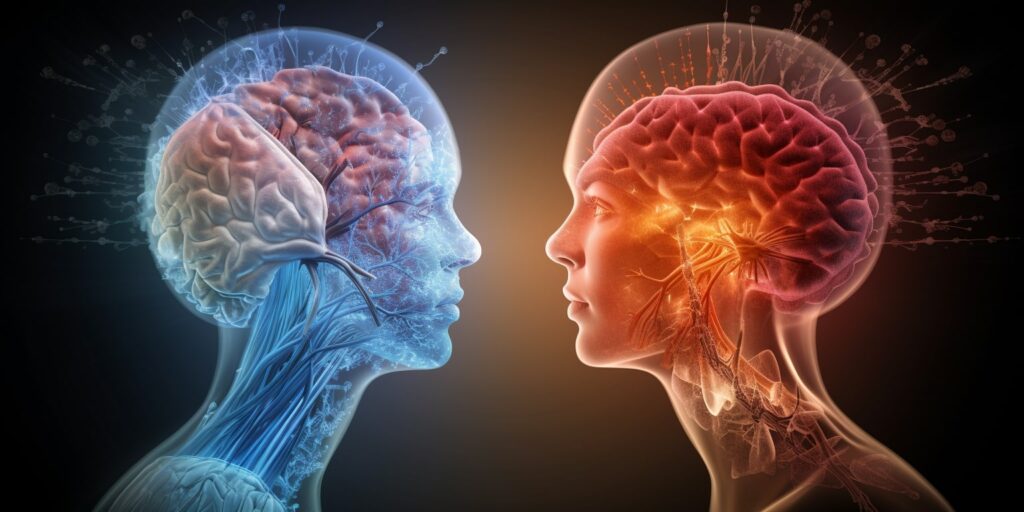Welcome to our article on the fascinating world of obsessive-compulsive disorder (OCD) and its connection to the human brain. OCD is a mental health condition that affects millions of people worldwide and is characterized by intrusive thoughts (obsessions) and repetitive behaviors (compulsions). In this article, we will explore the neuroscientific aspects of OCD, shedding light on what happens in the brains of individuals with this condition.
Understanding the neural processes behind OCD is crucial in unraveling the mysteries of this complex disorder. Through neuroscientific research, we can gain valuable insights into the neurobiological basis of obsessive-compulsive behaviors. By delving into the specific regions and neural pathways involved, we can uncover the underlying mechanisms behind OCD’s symptoms and develop effective treatment strategies.
So, join us on this enlightening journey as we dive into the intricate world of the brain and OCD. We will not only explore the signs and symptoms of OCD but also discuss the impact of this disorder on the brain and the various treatment options available. Additionally, we will provide practical coping strategies and insights into living with OCD, emphasizing the importance of support systems and resources for those facing the daily challenges of this condition.
Let’s dive deeper into the fascinating realm of the neuroscience of OCD and discover how our understanding of the brain can help individuals living with this disorder.
Signs and Symptoms of OCD
In this section, we will discuss the common signs and symptoms of Obsessive Compulsive Disorder (OCD). Recognizing these indicators is crucial in understanding the condition and finding appropriate help and support. OCD is a mental health disorder characterized by recurring thoughts (obsessions) and repetitive behaviors (compulsions) that can significantly impact daily life.
Common signs of OCD:
- Excessive worry about cleanliness, germs, or contamination.
- Repeatedly checking things, such as locks, appliances, or personal belongings.
- Compulsive counting, tapping, or arranging objects in a specific way.
- Intense need for symmetry, precision, or orderliness.
- Intrusive thoughts or images that cause distress.
- Frequent fear of causing harm or making mistakes.
Common symptoms of OCD:
- Spending significant amounts of time on obsessions and compulsions, often causing distress and interference with daily activities.
- Difficulty controlling or stopping obsessive thoughts or compulsive behaviors.
- Feelings of anxiety or panic when unable to perform rituals or engage in compulsions.
- Impaired social, occupational, or academic functioning due to OCD symptoms.
- Recognizing the irrationality of obsessions and compulsions but feeling unable to stop or ignore them.
If you or someone you know is experiencing these signs and symptoms, it is important to seek professional help. OCD is a treatable condition, and with the right support and treatment, individuals can effectively manage their symptoms and improve their quality of life.
The Brain and OCD
In this section, we will explore how OCD affects the brain and gain insights into the neurobiological basis of this disorder. Obsessive Compulsive Disorder (OCD) is a mental health condition characterized by recurring and intrusive thoughts, known as obsessions, along with repetitive behaviors, known as compulsions.
The underlying neuroscientific processes of OCD involve specific regions and neural pathways in the brain. Studies have shown that abnormalities in the communication between different brain areas, such as the orbitofrontal cortex, anterior cingulate cortex, and basal ganglia, play a significant role in the development and maintenance of OCD symptoms.
These brain regions and pathways are responsible for regulating emotions, decision-making, and sensorimotor functions. In individuals with OCD, there is evidence of hyperactivity in these circuits, leading to an exaggerated response to perceived threats or uncertainties.
The dysfunction in these brain circuits contributes to the intrusive thoughts and urges that drive obsessive-compulsive behaviors. For example, someone with OCD may feel compelled to perform repetitive rituals, such as excessive hand washing or checking locks, in an attempt to alleviate anxiety or prevent imagined harm.
Neurotransmitters and OCD
Research suggests that imbalances in certain neurotransmitters, such as serotonin, dopamine, and glutamate, also contribute to the development of OCD. Serotonin, in particular, plays a crucial role in regulating mood, anxiety, and impulse control.
- Low levels of serotonin have been associated with increased anxiety, which can trigger obsessive thoughts and compulsive behaviors.
- Abnormalities in dopamine levels may contribute to the reward-seeking and reinforcement aspects of compulsions, as individuals with OCD often experience relief and gratification after performing their rituals.
- Glutamate, an excitatory neurotransmitter, is involved in the transmission of signals between neurons. Dysregulation of glutamate levels may disrupt the balance of communication within the brain circuits implicated in OCD.
Understanding the intricate interplay between brain regions, neural pathways, and neurotransmitters in OCD can help researchers and clinicians develop more targeted and effective treatments for this complex disorder.
OCD Treatment and Therapy
In this section, we will explore the various treatment options available for Obsessive Compulsive Disorder (OCD). Seeking appropriate treatment and therapy can significantly improve the quality of life for individuals living with OCD.
Cognitive-Behavioral Therapy (CBT)
Cognitive-Behavioral Therapy is a highly effective therapeutic approach for treating OCD. It aims to identify and challenge negative thought patterns and behaviors that contribute to obsessive-compulsive symptoms. Through CBT, individuals learn strategies to manage their obsessions and compulsions, gradually reducing the impact of OCD in their daily lives. By working closely with a trained therapist, patients can develop coping mechanisms and build resilience against OCD’s intrusive thoughts and urges.
Medication
Medication can play a crucial role in the treatment of OCD, especially for individuals with moderate to severe symptoms. Selective serotonin reuptake inhibitors (SSRIs) are commonly prescribed antidepressants that are effective in managing OCD symptoms. These medications work by increasing serotonin levels in the brain, which helps regulate mood and reduce obsessive thoughts and compulsive behaviors. It’s important to consult with a qualified healthcare professional to determine the appropriate medication and dosage for each individual.
Complementary Therapies
In addition to CBT and medication, there are several complementary therapies that can supplement OCD treatment. These include mindfulness exercises which promote awareness and acceptance of obsessive thoughts without judgment, support groups that provide a safe space for individuals to share their experiences and gain support from others facing similar challenges, and lifestyle changes such as regular exercise, healthy eating, and stress management techniques that contribute to overall well-being and help alleviate OCD symptoms.
It’s important to note that treatment for OCD is highly individualized, and what works for one person may not work for another. Consulting with a qualified mental health professional is crucial in developing a personalized treatment plan tailored to each individual’s unique needs. With a comprehensive approach that combines therapy, medication, and support, individuals can manage their OCD symptoms and experience an improved quality of life.
Living with OCD and Coping Strategies
Living with Obsessive Compulsive Disorder (OCD) can pose numerous challenges, but there are coping strategies that can help individuals navigate their daily lives more effectively. By implementing these strategies and seeking proper OCD support and help, individuals can enhance their quality of life and manage their symptoms more effectively.
1. Educate Yourself about OCD
Understanding OCD is an essential first step in living with the disorder. Read books, articles, or reliable online resources to gain insights into the nature of OCD, its causes, and available treatment options. Educating yourself can empower you to make informed decisions about your own well-being.
2. Seek Professional Help
Reaching out to a mental health professional, such as a psychologist or psychiatrist, can provide valuable guidance and support tailored to your specific needs. They can help diagnose OCD and recommend appropriate treatment options based on your individual circumstances.
3. Adopt Cognitive-Behavioral Therapy (CBT)
Cognitive-Behavioral Therapy (CBT) is a scientifically proven treatment approach for OCD. It focuses on identifying and challenging irrational thoughts and behaviors while providing strategies to replace them with more adaptive ones. Work closely with a therapist specializing in OCD to implement CBT techniques into your daily life.
4. Build a Support System
Living with OCD can be overwhelming at times, but having a reliable support system can make a significant difference. Share your experiences with trusted friends, family members, or support groups who understand and empathize with your challenges. Their support and encouragement will help you navigate through difficult moments.
5. Practice Self-Care
Self-care activities are crucial in managing stress and anxiety associated with OCD. Find activities that help you relax and restore your mental well-being, such as practicing mindfulness meditation, engaging in regular physical exercise, getting enough sleep, and maintaining a balanced diet. Prioritize self-care to maintain your overall mental health.
6. Stay Connected to OCD Resources
Stay up-to-date with the latest OCD resources, such as websites, online forums, and support groups dedicated to OCD. These resources provide valuable information, coping techniques, and a sense of community, allowing you to connect with others facing similar challenges.
7. Set Realistic Goals
Living with OCD may require adjusting your expectations and setting realistic goals. Break down tasks into smaller, more manageable steps, celebrating each accomplishment along the way. By setting realistic goals, you can reduce stress and maintain your motivation on the path to recovery.
8. Practice Mindfulness
Mindfulness is a powerful tool in managing OCD symptoms. By staying present in the moment and observing your thoughts and feelings without judgment, you can reduce anxiety and gain a better sense of control. Consider incorporating mindfulness exercises, such as deep breathing or meditation, into your daily routine.
Living with OCD can be challenging, but by implementing coping strategies, seeking support, and prioritizing self-care, individuals can lead fulfilling lives. Remember, you are not alone. Reach out to the OCD community and take the necessary steps to manage your condition effectively.
Summary
In conclusion, understanding the neuroscience of OCD has provided valuable insights into the complexities of this disorder. Through neuroscientific research, we have gained a deeper understanding of how the brain is impacted by OCD, shedding light on the neural processes underlying obsessive-compulsive behaviors.
Early diagnosis plays a crucial role in the effective management of OCD. Recognizing the signs and symptoms can lead to timely intervention and appropriate treatment, improving the overall quality of life for individuals with OCD.
Furthermore, the availability of various treatment options, such as cognitive-behavioral therapy (CBT) and medication, offers hope for those living with OCD. However, it is essential to approach treatment holistically, considering the disorder’s psychological and physiological aspects.
Ongoing support and a strong support system are crucial for individuals navigating the challenges of OCD. Access to resources, support groups, and self-care practices can contribute to overall well-being and help individuals develop effective coping strategies.



